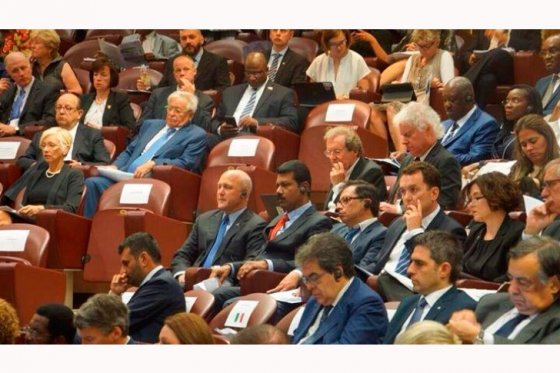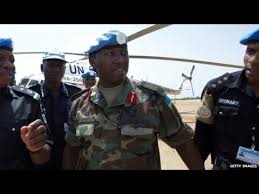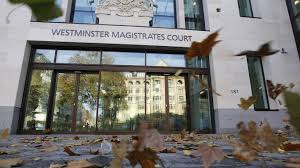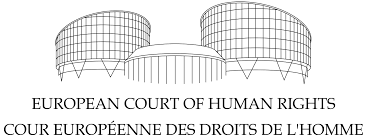Sidebar
News
1945-1949 CE 1945-1949 CE
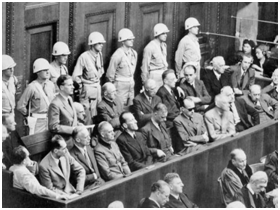
Although the legitimacy of the Tribunal was compromised from the outset in the absence of similar precedents in the history of universal prosecution, the work done for the definition of the crimes (also until then unusual in its magnitude) and procedures for development They serve the cause forward for the establishment of international justice.
Thus, concepts of crimes previously absent or vaguely defined as a crime against humanity, evoked in The Hague Convention of 1907. materialize. He also was modified the traditional approach to the rules of international law that focused on the relations between states, but not in the rights and duties of individuals. Since then, the crimes committed by individuals of a nation across several countries could be judged internationally by all affected countries, as it was in the formation of the Nuremberg Tribunal.
In the Nuremberg trials, the Allied powers prosecuted Nazi leaders for war crimes and crimes against humanity. It is the first criminal trial in history to try crimes committed by people in wartime.
November 20, 1945
Start the fundamental process against the main culprits and captured a number of key organizations accused of crimes against peace, war crimes and crimes against humanity led by the International Military Tribunal whose livelihood was the London Charter against 24 main surviving leaders of the Nazi government.
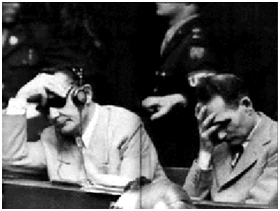
February 13, 1946
The United Nations General Assembly through Resolution (3) recognized as of the following offenses: crimes against peace, war crimes and crimes against humanity as contained in the Charter of the International Military Tribunal at Nuremberg.
December 11, 1946
With the adoption of Resolution (95) confirming the principles of international law recognized in the Charter of the Nuremberg Court and judgments of the Court.
(ECOSOC) United Nations Economic and Social Council, to investigate cultural and social issues, established the Commission on Human Rights and initial aim of the commission was the elaboration of an international declaration, defining human rights.
Following the Nuremberg trials, an international conference in Paris to establish an international criminal code. In this meeting, the International Criminal Court is born.
November 21, 1947
By Resolution (177) was adopted created an Ad Hoc Committee to formulate the principles of international law.
Resolutions (3), (95) and (177) were used for the constitution of the ad hoc tribunals for the prosecution of crimes committed in the former Yugoslavia and Rwanda later to the creation of the Permanent International Criminal Court.
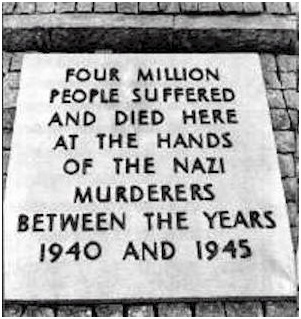
In the year 1948
ILO adopts Convention on Freedom of Association and Protection of the Right to Organize.
The Organization of American States adopted the Declaration of the Rights of Man.
UN adopts the Genocide Convention on 9 December.
The next day, December 10 The UN General Assembly adopted the Universal Declaration of Human Rights (the international articulation of primary and inalienable fundamental rights of all human beings and the first global agreement among nations about the specific rights and freedom of all human beings), the first step in the future development of the Charter of Human Rights for the elaboration of which elapse another 18 years.
Add a comment
Responding to a call from Pope Francis, mayors from around the world gathered at a Vatican summit on Tuesday declared that stronger action on climate change is “a moral imperative,” and called human trafficking a “crime against humanity.”
The mayors, from cities such as New York, Boston, Paris, and Stockholm, issued a joint declaration at the end of the first day of a two-day conference at which Pope Francis urged the gathered politicians to take action on both global warming and slavery, arguing that there’s a clear link between the exploitation of nature and of human beings.
Interesting article published on the web www.expatica.com about the genocide and the International Criminal Court.
We recommend to you read this.
We, the families of the Spanish nationals who died violently in Rwanda and the Democratic Republic of Congo between 1994 and 2000:
- JOAQUIM VALLMAJÓ SALA (BYUMBA, NORTHERN RWANDA, + April 26, 1994)
- SERVANDO MAYOR GARCÍA, JORGE JULIO RODRÍGUEZ, MIGUEL ANGEL ISLA AND FERNANDO LUCIO DE LA FUENTE DE LA FUENTE (BUGOBE / BUKAVU, EASTERN DRC, + October 31, 1996).
- Mª FLORS SIRERA FORTUNY, MANUEL MADRAZO OSUNA, LUIS VALTUEÑA GALLEGO (RUHENGERI, NORTHERN RWANDA, + January 18, 1997)
- ISIDRO UZCUDUN POUSO (MUGINA, GITARAMA, CENTRAL Rwanda, + June 10, 2000)
having learned of the arrest of General KARAKE KARENZI in London (UK), under an international arrest warrant and a European arrest warrant issued by the Spanish courts in accordance with international law and the principles of international law.
More than 100 lawyers and human rights defenders and their relatives have been detained or questioned as Chinese authorities carried out an unprecedented nationwide crackdown on human rights activists over the weekend.
As of July 14 at 7:30pm in Hong Kong, the total number of people who have been summoned, questioned, arrested, or detained had reached 159 across 24 cities and provinces, according to the China Human Rights Lawyers Concern Group. Of those, 10 are still detained by authorities, the whereabouts of 14 are unknown, and 135 have been released, said the Hong Kong-based advocacy group.
After almost eight years since the young Vincent Lambert suffer a serious accident, the European Court of Human Rights has ruled. The decision will serve as jurisprudence from today to all member states.
Add a comment
